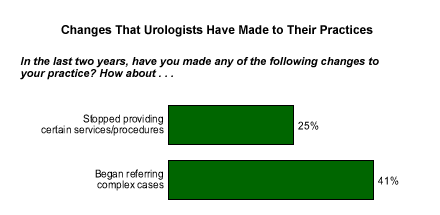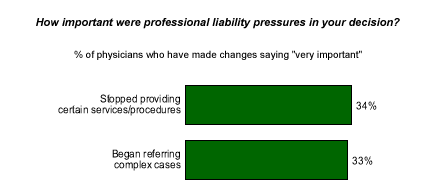The American Medical Association has named 18 states as currently in a state of medical liability "crisis," based primarily on the number of residents losing access to medical care as a result. An American Hospital Association study of more than 1,000 hospitals in those states finds that 53% of those hospitals say the crisis has made it more difficult to recruit physicians. Thirty-five percent report that liability insurance problems have negatively affected the ability to provide services, and 19% report that high liability premiums have significantly affected the community's access to care (see Related Sites).
How has this situation affected the practices of individual physicians? As part of a February 2003 study for the American Urological Association*, Gallup interviewed a national random sample of 510 urologists who have completed urological residencies. Results of this survey show that obtaining malpractice insurance is a serious problem even with regard to urology, generally not considered a high-risk specialty, and that many urologists have been forced to change the way they practice medicine in response to liability concerns.
Impact of the Malpractice Crisis on Urologists
According to the survey, virtually all urologists (99%) have professional medical liability insurance. However, 26% of urologists with this insurance reported that they had trouble obtaining it in 2003, with 12% reporting that getting coverage was a major problem. The problem seems to be most acute for urologists in the Southeast. The survey also showed that the average annual premium for basic professional medical liability coverage among urologists increased 20% between 2002 and 2003.
How are urologists dealing with increasing liability insurance costs and problems in obtaining coverage? The answer is simple: many of them are restricting their services. Gallup asked urologists whether they have made several types of changes to their practices (such as reducing patient care hours, beginning to refer complex cases, stopping certain services or procedures, etc.) in the last two years, and then asked them how important "professional liability pressures" were in their decisions to make these changes.
Although urologists have made many different types of changes to their practices, the malpractice crisis seems to significantly influence two changes in particular. One quarter of urologists reported that they have stopped providing certain services or procedures (such as cystectomies, prostatectomies, and other high-risk surgeries) during the past two years, and of that group, 34% say professional liability pressures were "very important" in their decisions to stop providing those services. A significant percentage of urologists -- 41% -- have also started referring complex cases to other physicians in the past two years, and a third (33%) of that group says professional liability pressures were a very important factor in those decisions.


Bottom Line
Unlike obstetrics or neurosurgery, urology is not a specialty particularly associated with risky procedures. Even so, worries about malpractice insurance have taken a significant toll on this field. It is likely that many medical specialties are feeling the effects of this crisis to an even greater extent.
*These results are based on telephone interviews with randomly selected sample of 510 urologists who have completed urological residencies. Interviews conducted in January and February 2003. For results based on this sample, one can say with 95% confidence that the maximum error attributable to sampling and other rand effects is ±5%.